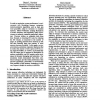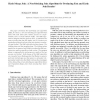7 search results - page 1 / 2 » Memory-Contention Responsive Hash Joins |
VLDB
1994
ACM
13 years 9 months ago
1994
ACM
In order to maximize systemperformancein environments with fluctuating memory contention, memory-intensive algorithms such as hash join must gracefully adapt to variations in avai...
ICDE
2004
IEEE
14 years 7 months ago
2004
IEEE
This paper introduces the hash-merge join algorithm (HMJ, for short); a new non-blocking join algorithm that deals with data items from remote sources via unpredictable, slow, or ...
EDBT
2008
ACM
14 years 5 months ago
2008
ACM
This paper studies the problem of evaluating continuous multi-way joins on top of Distributed Hash Tables (DHTs). We present a novel algorithm, called recursive join (RJoin), that...
SIGMOD
2010
ACM
13 years 10 months ago
2010
ACM
Online aggregation is a promising solution to achieving fast early responses for interactive ad-hoc queries that compute aggregates on a large amount of data. Essential to the suc...
TELETRAFFIC
2007
Springer
13 years 11 months ago
2007
Springer
In structured peer-to-peer (P2P) networks participating peers can join or leave the system at arbitrary times, a process which is known as churn. Many recent studies revealed that ...


